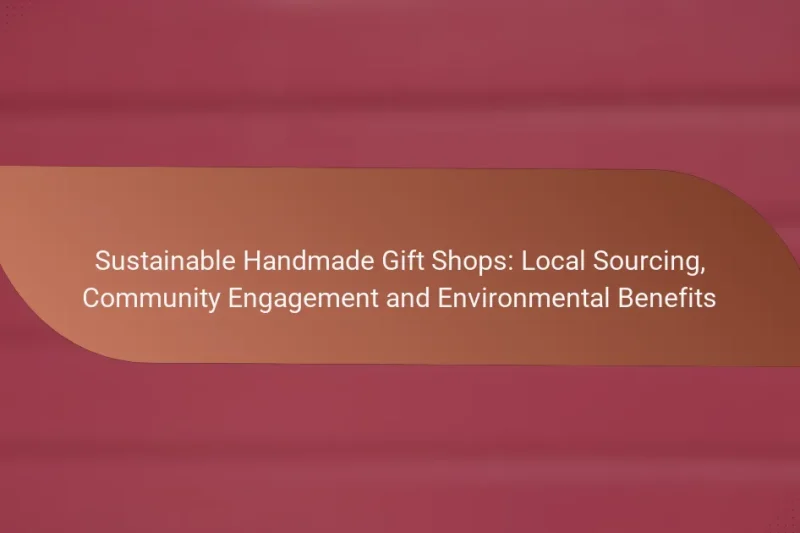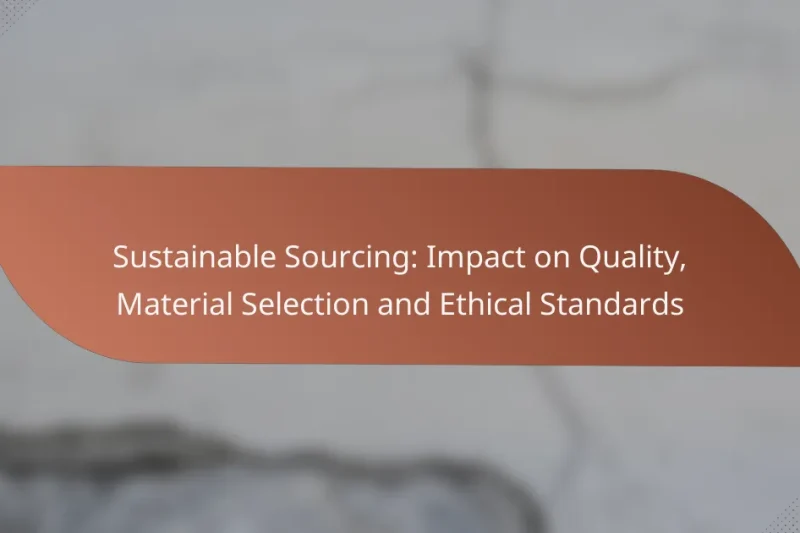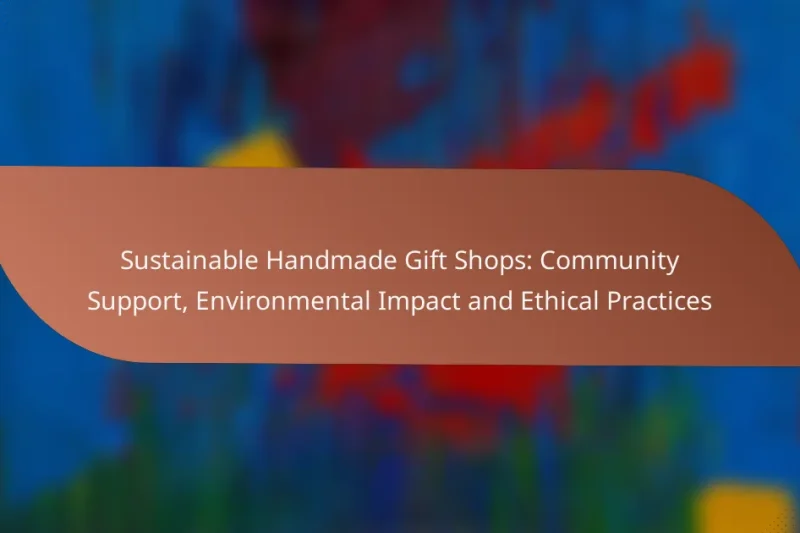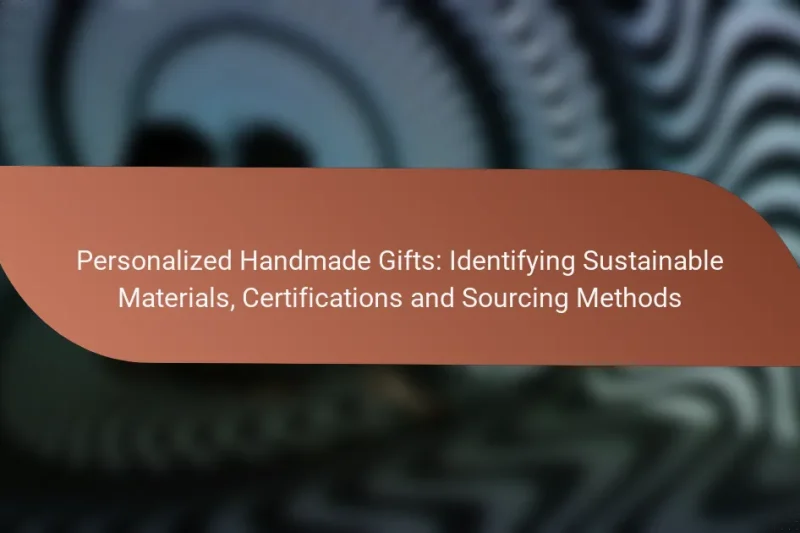Sustainable handmade gift shops are vital for local economies, as they support artisans, create jobs, and … Sustainable Handmade Gift Shops: Local Sourcing, Community Engagement and Environmental BenefitsRead more
Personalized Handmade Gift Shops: Sustainable Sourcing Practices
Personalized handmade gift shops are increasingly embracing sustainable sourcing practices by utilizing local materials and partnering with ethical suppliers. This commitment not only minimizes environmental impact but also bolsters local economies and encourages responsible consumption. By choosing eco-friendly and ethically produced gifts, consumers can enjoy unique items while supporting a more sustainable future.
Sustainable Sourcing: Impact on Quality, Material Selection and Ethical Standards
Sustainable sourcing plays a crucial role in enhancing product quality by focusing on environmentally friendly and … Sustainable Sourcing: Impact on Quality, Material Selection and Ethical StandardsRead more
Personalized Handmade Gifts: Eco-Friendly Options, Quality Assurance and Unique Designs
Discover the charm of personalized handmade gifts that beautifully blend eco-friendliness with unique designs. From recycled … Personalized Handmade Gifts: Eco-Friendly Options, Quality Assurance and Unique DesignsRead more
Personalized Gift Retailers: Sustainability Practices, Transparency and Consumer Trust
Personalized gift retailers are increasingly prioritizing sustainability to reduce their environmental impact and foster consumer trust. … Personalized Gift Retailers: Sustainability Practices, Transparency and Consumer TrustRead more
Sustainable Handmade Gift Shops: Community Support, Environmental Impact and Ethical Practices
Sustainable handmade gift shops are vital for nurturing local economies and fostering community ties by providing … Sustainable Handmade Gift Shops: Community Support, Environmental Impact and Ethical PracticesRead more
Personalized Handmade Gifts: Identifying Sustainable Materials, Certifications and Sourcing Methods
When creating personalized handmade gifts, selecting sustainable materials is essential for both environmental impact and quality. … Personalized Handmade Gifts: Identifying Sustainable Materials, Certifications and Sourcing MethodsRead more
Personalized Gift Choices: Carbon Footprint, Sourcing Impact and Eco-Conscious Decisions
In today’s eco-conscious world, personalized gifts are not just about uniqueness but also about minimizing environmental … Personalized Gift Choices: Carbon Footprint, Sourcing Impact and Eco-Conscious DecisionsRead more
How do personalized handmade gift shops in the US ensure sustainable sourcing?
Personalized handmade gift shops in the US prioritize sustainable sourcing by focusing on local materials, forming partnerships with ethical suppliers, and utilizing recycled or upcycled materials. These practices not only reduce environmental impact but also support local economies and promote responsible consumption.
Use of local materials
Many personalized handmade gift shops source materials locally to minimize transportation emissions and support regional economies. By using materials from nearby suppliers, these shops can ensure freshness and quality while fostering community relationships.
For example, a shop in California might use locally sourced wood or textiles, which not only reduces carbon footprints but also highlights the unique characteristics of the region. This approach often resonates with customers who value authenticity and local craftsmanship.
Partnerships with ethical suppliers
Building partnerships with ethical suppliers is crucial for ensuring that materials are sourced responsibly. Shops often vet suppliers based on their labor practices, environmental standards, and commitment to sustainability.
For instance, a gift shop might collaborate with a supplier who uses fair trade practices or who adheres to strict environmental regulations. This transparency helps customers feel confident that their purchases support ethical practices.
Recycled and upcycled materials
Utilizing recycled and upcycled materials is another effective strategy for sustainable sourcing. Many shops incorporate items that have been repurposed, reducing waste and the need for new resources.
For example, a shop might create jewelry from reclaimed metals or home decor from repurposed glass. This not only gives new life to discarded materials but also appeals to environmentally conscious consumers looking for unique, eco-friendly gifts.
What are the benefits of sustainable sourcing for handmade gifts?
Sustainable sourcing for handmade gifts offers numerous advantages, including environmental protection, economic support for local communities, and improved product quality. By prioritizing eco-friendly materials and ethical practices, consumers can make a positive impact while enjoying unique, handcrafted items.
Environmental impact reduction
Sustainable sourcing significantly reduces the environmental footprint of handmade gifts. By using materials that are renewable, biodegradable, or recycled, artisans help minimize waste and decrease pollution. For instance, opting for organic cotton or reclaimed wood can lessen the demand for harmful manufacturing processes.
Additionally, many sustainable practices involve local sourcing, which cuts down on transportation emissions. This approach not only conserves energy but also supports a more sustainable supply chain.
Support for local economies
Purchasing handmade gifts from local artisans strengthens community economies. When consumers buy from local shops, a larger portion of the money stays within the community, fostering job creation and supporting local businesses. This is particularly important in regions where small-scale artisans rely on sales to sustain their livelihoods.
Moreover, supporting local artisans often means investing in unique cultural traditions and craftsmanship, which can enhance community identity and pride.
Enhanced product quality
Sustainable sourcing typically results in higher quality handmade gifts. Artisans who prioritize ethical practices often take greater care in their work, using superior materials and techniques. This attention to detail can lead to products that are not only more durable but also more aesthetically pleasing.
Furthermore, sustainable products often come with a story behind them, adding emotional value and uniqueness that mass-produced items lack. Customers appreciate knowing the origins of their gifts, which can enhance their overall satisfaction with the purchase.
Which brands exemplify sustainable practices in handmade gifts?
Several brands stand out for their commitment to sustainable practices in the handmade gift sector. These companies prioritize ethical sourcing, eco-friendly materials, and fair labor practices, making them excellent choices for conscious consumers.
Ten Thousand Villages
Ten Thousand Villages is a pioneer in fair trade, partnering with artisans from developing countries to create unique handmade gifts. The brand emphasizes sustainable sourcing by ensuring that all products are made from environmentally friendly materials, such as recycled or natural fibers.
When shopping at Ten Thousand Villages, customers can expect transparency regarding the artisans’ working conditions and the sourcing of materials. This commitment not only supports local economies but also promotes cultural preservation.
Uncommon Goods
Uncommon Goods focuses on offering a wide range of handmade gifts that are both unique and sustainably sourced. The company prioritizes products made from recycled, reclaimed, or organic materials, ensuring minimal environmental impact.
In addition to their eco-friendly practices, Uncommon Goods has a strong commitment to social responsibility. They work with artisans and small businesses that adhere to fair labor practices, making it easy for consumers to make ethical purchasing decisions.
EarthHero
EarthHero specializes in eco-friendly products, including a selection of handmade gifts that are sustainably sourced. The brand is dedicated to reducing waste and promoting a circular economy by offering items made from recycled or biodegradable materials.
Customers can find a variety of handmade gifts at EarthHero, from home decor to personal accessories. The company also provides information on the environmental impact of each product, helping consumers make informed choices that align with their values.
What criteria should consumers consider when choosing sustainable gifts?
Consumers should focus on the material origin, certifications, and production methods when selecting sustainable gifts. These factors help ensure that the gifts are environmentally friendly and ethically produced.
Material origin
The source of materials used in handmade gifts is crucial for sustainability. Look for items made from organic, recycled, or locally sourced materials, as these tend to have a lower environmental impact. For example, gifts crafted from bamboo or reclaimed wood are often more sustainable than those made from virgin plastics or non-renewable resources.
Additionally, consider the distance materials travel to reach the maker. Locally sourced materials not only support local economies but also reduce carbon emissions associated with transportation.
Certifications and labels
Certifications and labels can provide assurance that a product meets specific sustainability standards. Look for recognized certifications such as Fair Trade, USDA Organic, or Global Organic Textile Standard (GOTS). These labels indicate that the products adhere to ethical sourcing and production practices.
Be cautious of vague claims like “eco-friendly” without supporting evidence. Always check for credible certifications that verify the sustainability of the gift.
Production methods
The methods used to produce handmade gifts significantly impact their sustainability. Artisans who utilize low-impact techniques, such as handcrafting or small-batch production, often have a smaller carbon footprint than those using mass production methods.
Additionally, inquire about the energy sources used in production. Gifts made using renewable energy, such as solar or wind power, are generally more sustainable. Avoid products that rely heavily on fossil fuels or harmful chemicals in their creation.
How can consumers identify truly sustainable handmade gift shops?
Consumers can identify truly sustainable handmade gift shops by examining their sourcing practices, transparency, and customer feedback. Key indicators include the shop’s commitment to ethical materials, clear communication about their production processes, and any sustainability certifications they may hold.
Researching brand transparency
Brand transparency is crucial for identifying sustainable handmade gift shops. Look for shops that openly share information about their sourcing, production methods, and the origins of their materials. A transparent brand often provides details on their website or product descriptions, allowing consumers to make informed choices.
Check for clear narratives about the artisans involved and the environmental impact of their practices. Brands that prioritize sustainability typically highlight their commitment to ethical labor and eco-friendly materials.
Reading customer reviews
Customer reviews can provide valuable insights into a shop’s sustainability practices. Look for feedback that specifically mentions the quality of materials, the ethical nature of the products, and the overall shopping experience. Positive reviews often highlight a brand’s commitment to sustainability.
Pay attention to recurring themes in reviews, such as mentions of eco-friendly packaging or the use of recycled materials. This can help you gauge whether the shop genuinely practices sustainable sourcing or is merely marketing itself as such.
Checking for sustainability certifications
Sustainability certifications can serve as reliable indicators of a handmade gift shop’s commitment to eco-friendly practices. Look for certifications from recognized organizations that focus on ethical sourcing and environmental responsibility. Examples include Fair Trade, Global Organic Textile Standard (GOTS), and Forest Stewardship Council (FSC).
While certifications can enhance credibility, it’s essential to verify their authenticity. Research the certifying body and understand what the certification entails to ensure it aligns with your values regarding sustainability.
What are the challenges in sustainable sourcing for handmade gift shops?
Sustainable sourcing for handmade gift shops involves various challenges, primarily related to cost, availability of materials, and ethical considerations. These challenges can significantly impact the overall pricing and supply chain of handmade products.
Higher production costs
One of the main challenges in sustainable sourcing is the higher production costs associated with ethically sourced materials. Handmade gift shops often rely on organic, recycled, or locally sourced materials, which can be more expensive than mass-produced alternatives.
For example, using organic cotton or sustainably harvested wood may increase the cost of goods sold by 20-50% compared to conventional materials. This can lead to higher retail prices, which may deter some customers.
To manage these costs, shops can consider strategies such as bulk purchasing, forming partnerships with local artisans, or offering pre-orders to gauge demand before committing to large orders. Balancing quality and affordability is crucial for maintaining customer loyalty while promoting sustainable practices.






